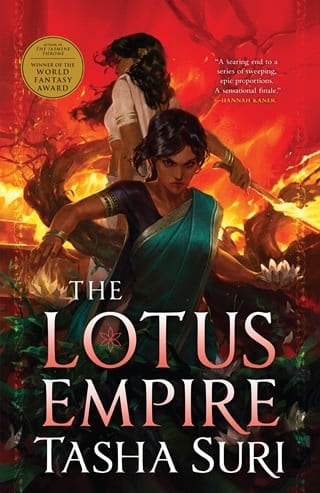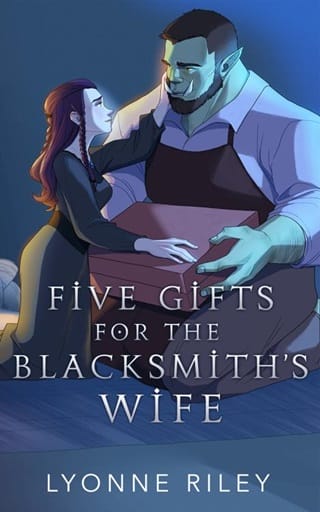Chapter 50 Bhumika
BHUMIKA
The villagers were not invited into the monastery until morning, which left them to a night of worry and speculation. They sat in groups in the grain store and waited for dawn and for judgment.
Manjeet took the wait stoically, but Bidisha was furious. She said nothing to Bhumika, but her glare was ferocious, and her whispers to the other women weren’t subtle. She blamed Bhumika for their plight. Bhumika had encouraged them to break village taboos; Bhumika had brought herself and her Ahiranyi blood to their village, and what had followed in her wake? Strange paths, and rot, and displacement from their home. Nothing but wreckage and grief.
Bhumika knew breaking taboos had not brought the village to ruin, but she still wondered if Bidisha was correct for blaming her for their ill fortune. Perhaps Bhumika’s presence alone had been enough. She held her silence through the night, Jeevan’s body a warm and solid comfort at her side.
When Prince Rao arrived once more, guards from the monastery behind him, the villagers scrambled to their feet. Their fear was palpable.
The priest Ishan stepped forward, holding his hands up in a placating manner.
“Come with us,” Ishan urged. “I promise no harm will come to you.”
After a brief hesitation, the villagers gathered their courage and followed him.
Beyond the grain stores, the forest had grown even more rot-riven. Bhumika could smell the faint stench of meat. The distant trees, hazy in the light, were mottled like cold flesh.
There was a thunderous crack of noise. The trees bent and swayed above them, although there was no wind to move them. The ground shook.
Bhumika’s knees buckled. She caught herself just in time, finding her balance even as her vision swayed violently.
She felt the yaksa under the earth, waking, its eyes of sap peeling open, its mouth open on a rattling scream. And she felt something else. Something had touched her for a moment—a dizzying image of a younger woman with pin-straight hair and a crooked smile turning to her, and a yaksa with a mouth of thorns, and then abruptly nothing. It was as if a great presence had brushed against both her and the newborn yaksa, then vanished.
“ She was close ,” a watcher whispered. A girl, water dripping from the long braid of her hair. Yearning in her voice.
“Who?” Bhumika asked. She did not think her ghost spoke of the yaksa. Jeevan looked at her sharply.
The watcher shook her head, then faded into morning mist.
Bhumika took a fortifying breath and straightened up. “The yaksa,” she said to him. “We have no more time. It wakes.”
The ground shook again. Prince Rao took an abrupt step toward her.
“Can you stop this?” he demanded. “As an Elder—”
“She does not remember herself,” Jeevan said sharply, cutting through Prince Rao’s words. “My lady can give you the knowledge of how to kill the yaksa, but beyond that she owes you nothing.”
“I made a sacrifice of myself for this knowledge,” Bhumika said. Her vision was beginning to settle, nausea in its wake. “Any power I had, I no longer have. You seem angry at me, Prince Rao. I am sorry for it. But any debts I owe you, I cannot pay.” She held her palms open. “In many ways, what you see before you is a ghost.”
He looked stricken for a moment. Then the look passed, settling into something far more determined and focused, and devoid of softness.
“Move quickly,” he barked. “All of you.”
Quickly was difficult, with elderly and small children in their group. But they soon shuffled up the stairs of the monastery and into its gray-stoned corridors. Flickering torchlight guided them to a doorway. An older priest was waiting.
“Take them in there,” he ordered the guards and Ishan. He bowed his head in respect to Prince Rao, then swiftly walked away.
They entered. The room was large and circular. But the first thing Bhumika noticed was how it felt—like the lake in the caravanserai. Like a dark pool, a door, a gateway vaster and stranger than any seeker’s path. Her heart thrummed. How powerful would it have felt when the waters still stood here?
“This hall,” Bhumika murmured, awed. She turned, a slow arc that allowed her to take in the curving walls, the tessellated stone of the floor, opening like a flower—and the ring of ghostly water-drenched figures that now circled her. At her side, Jeevan saw none of them—only tracked her movement with his eyes, as his other hand rested close to his saber, wary of threats. Ever since the Aloran prince had raised his dagger, Jeevan had been on alert.
Beyond the crescent of her ghosts, the villagers huddled together, no threat to her at all. Only the Aloran prince carried a weapon, sheathed at his belt with his hand on the hilt, and he was looking at her—and her slow, awed movement—with confusion.
“Do you not feel it, Prince Rao?” Bhumika asked.
Rao shook his head.
“No, Elder Bhumika,” he said. “I don’t understand.”
Elder. That word again. She let it slip away unquestioned. Now was not the time to worry about her past.
It was not the watchers who guided her this time but her own good sense. Her gaze lowered to the strange stone dagger still at his waist. It was only when he’d dropped the blade that his eyes had shone, and she had felt the knowledge in her stir in recognition of that light.
“The dagger you carry,” Bhumika said. “The one made of dark stone. Lay it on the ground.”
Rao did not move. So Bhumika said mildly, “Do you think I will seize it from you? Give it to one of your soldiers if you prefer.”
Another heartbeat passed, and then he removed the dagger from his belt and held it out to one of his men, who took it from him. She saw him inhale, and saw his eyes widen. Starry light flared in his eyes, then faded once more.
“What is this place?” Rao asked.
“This is what makes the monastery sacred, Prince Rao.” The head priest entered the room, his vast voice preceding him. “A sacred lake lay here in the Age of Flowers. Those who gazed into it fell directly into the arms of the nameless—into visions vast enough to drive them to madness.” He shook his head. “Common folk claim that it lies beyond the forest, in a caravanserai. But what remains of it lies beneath us.”
He walked farther into the hall. Without pause and without awareness, he stepped through one of the ghostly watchers. He did not feel them. He bent forward, reverently touching a hand to the ground. “Divyanshi prayed here,” he said. “When she departed, the water departed with her.”
From the corner of her eye, Bhumika saw Manjeet sharply nudge one of the women beside her. Bit by bit, the group lowered their heads in reverence.
The head priest did not appear to have noticed their previous lack of piety, or its sudden arrival. His focus was on Bhumika.
“My priests say you claim a yaksa is coming,” he said.
“I only claim the truth,” Bhumika said, inclining her head in respect. “The forest speaks more strongly than my words could. You see what has become of it.”
“Yes.” A pause. She saw disgust and hope war on his face. “You can kill a yaksa?”
“I can share the knowledge of how it can be done,” she said. “I cannot do so myself.”
“Daughter,” he said formally. “You came here to seek the help of the holiest priests of the nameless. If you can demonstrate your power, you have it.” Behind him, more priests entered the room—blue-garbed and solemn.
She should have been exultant to have the trust of the head priest. But her eyes were drawn inexorably to Rao—to this man with eyes that held a flame, who felt the power of this dead lake so strongly that even now he trembled, unable to look away from her in turn.
“Prove yourself,” the head priest said. “Prove you are no trickster, no charlatan or madwoman.” A twist to his mouth. “I implore you.”
“The yaksa will wake and come here,” said Bhumika. “It will come to destroy your sacred monastery, and this sacred space.” It will come for me , she did not say. That was the truth that would serve her like a knife to her own throat. “I can give you no proof that will not require you to face it.”
The head priest’s face hardened. But Bhumika looked once again at Rao.
“Prince Rao,” she called, and felt the strangeness of her own voice—as rich as it had been when she’d begged outside the monastery, when only the young priest had heeded her. “What do you see?”
“Fire,” he said. His voice sounded rough. “I see fire. And I see the dark of the nameless. And I see the—void. I see terrible danger ahead.” His voice broke a little upon that word. He met her eyes. “And you, Elder Bhumika?”
“I see your faith,” said Bhumika. “And I know it will guide you.”
He flinched at that. He swore, shaping the words without sound. Then he said, abruptly, “I believe her.”
“Prince Rao,” the head priest said, his voice low with concern. “Do you—”
Rao shook his head, speaking again.
“The nameless speaks in many ways, in many forms. Through visions, yes. But through other means, too. Through instinct. Through our sages and our teachers. Our parents. Through a man’s flesh, and a woman’s voice.” He stopped, turning to face the head priest—who flinched, as if struck by the flames of Rao’s eyes. “The nameless speaks,” he said finally. “And you— we —are failing to heed our god.” He touched a hand to his chest. “I feel it.”
The earth shuddered again. One of the boys whimpered, and Manjeet clenched him tight, looking at Bhumika and only Bhumika with a demand in her eyes.
“I feel the nameless too,” Ishan said. He took a step forward. “Lady,” he continued. “When you prayed I felt our god. I know I am not alone.” He looked at his fellow priests then. “Brothers. You felt it. How could you not? We were meant to be here. We were meant to learn from her, and save our people from the yaksa.”
A ripple of agreement ran through the priesthood. Not all. But enough. The head priest’s expression was unreadable, his eyes hard. But he said, heavily, hopefully, “I obey my god.”
The villagers were told to leave the room, urged away by guards. They would be hidden away in the far end of the monastery, where they would hopefully be safe from what was to come. The younger priests insisted the head priest Sunder join them. “For your safety, and the future of the monastery,” Ishan insisted earnestly—and the head priest relented.
Manjeet gave Bhumika a grave nod in farewell as she guided Gulnar out. Bidisha waited until last—and walked a few determined steps toward Bhumika before stopping.
“You are a curse,” Bidisha said. Her voice trembled. Her gaze darted from the priests and soldiers back to Bhumika. But there was defiance in her eyes, too. Bravely, she said, “You drew this evil here. I am no priest, no noble lord or lady, but I know we cannot trust you.”
“You should not be in this room for what will follow,” Bhumika said gently. “Go with the guards. Keep your people safe. You will not see me again, and I am grateful for the kindness you and your people showed me.”
Bidisha’s mouth thinned. She shook her head, then turned and walked away. As the villagers shuffled from the hall, Prince Rao made his way toward her.
“Speak with me alone, Lady Bhumika,” he said. It was an order, not a request. She nodded and followed him from the hall. She gave Jeevan a brief glance. Wait for me , she tried to say with her eyes. Trust me.
His mouth was thin with tension, but he inclined his head subtly in understanding.
Prince Rao led her to an alcove room. In the distance she could hear the footsteps of the villagers and low voices from the Aloran soldiers and the priests.
“Prince Rao,” she said, before he could speak. “Your weapon. Your blade of stone. It deadens magic, does it not?”
“I was told the stone is powerful enough to fight the yaksa,” he replied. “I know it is a tool that can hurt the servants of yaksa.” He said the words levelly, his gaze probing. When she stared back at him, unable to give him the reaction he was clearly seeking, he shook his head and continued. “I had already vowed to myself that I would protect the monastery with all the weapons I have, before the head priest told me about you. I can fight the yaksa, and I shall.”
“And yet,” she said, “you spoke to the head priest on my behalf. Why use my knowledge at all, if you believe you have the key to destroying the yaksa already?”
His smile was joyless. “I cannot ignore the nameless when my god speaks,” he said. “What right do I have to be so foolish?” From his tunic, he withdrew the dagger of stone. He must have taken it back from the soldier he’d handed it to and concealed it for this moment, though she did not immediately know why. It was only when he held it out with the blade toward her that she realized he planned to threaten her. His eyes, lusterless and human, were cold. “But, Lady Bhumika, I promise, if you prove yourself to be a traitor and a liar, I will put this blade through your heart myself.”
She held out her hand, palm open.
“Let me see this weapon that will kill me,” she said. When he did not relinquish it or place it through her heart, she said mildly, “Do you fear me so much, Prince Rao?”
“I’ve seen what your kind are capable of,” he said. But he placed the dagger on her palm.
She felt—nothing.
Utter nothing. She was silent inside, her head no longer aching, no longer roaring with waters. The absence of magic was absolute.
She returned the dagger to him. Her hand was trembling faintly.
“The yaksa will come here,” she said, after a beat, when her voice returned to her. “But I will need it pinned. Can you do so, with your weapons of stone?”
“I will try,” he said.
“The yaksa will fear the stone once they feel it,” Bhumika said. She hoped her own horror did not show on her face, but she was sure it did. “That will give you some advantage. And—it will be young. Newly reborn. That will help too.”
He tucked his blade away, moving to go. But she could not let him leave yet.
“Prince Rao.” He paused, looking at her. “Whatever happens here, I hope the villagers who traveled with me will be cared for. Their home has been destroyed. If they survive the yaksa today, they will starve tomorrow without assistance.”
His cold gaze finally thawed a little.
“If we survive, I will speak to the head priest,” he said, “and to a nearby highborn lord. I will ensure that they are cared for.”
“Thank you,” she said quietly.
“Come,” he said, looking a little uncomfortable. “We need to return.”
She returned to the hall. The villagers were gone. A handful of priests were waiting for her, many of them young, fervent light in their eyes.
“Kneel,” she said. “We’ll begin with prayer. Reach for your god.”
“And you?” Ishan asked.
“Reaching for the nameless is your task. I have no gods to reach,” she said. “What I need lies inside me.”
She kneeled too and closed her eyes. And breathed. And breathed.
She did not leave her body. She did not, indeed, pray. She closed her eyes, and she was kneeling in darkness—empty and vast and velvet beneath her.
A lake that had once opened to the nameless god—and to the void the god resided in. Kneeling on its remains, a part of her felt the void too.
Her watchers surrounded her. Against the darkness, they glowed with deathless light.
“Will you drink?”
“Tell me what you are to me first,” Bhumika said calmly. She was within the confines of her mind, where such things could be spoken.
“We are yours,” said a watcher. “Your kin, temple born and temple drowned, tangled forever in the weeds of magic, carrying the knowledge you cannot carry. We are your oldest grief, forgotten.”
She swallowed, seeking strength inside herself.
“I am ready to feel the weight of the knowledge now,” she said to them.
“It will hurt you,” said another watcher, with the voice of a terribly young child. “It will make you weep.” The face that stared at her through cloth had deep black eyes, miserable hollows. “We know.”
“Thank you for carrying the burden of it for me,” she said gently. “Ask me your question now. I am ready. I will answer.”
A chorus.
“Will you drink?”
“Yes.”
“ What will you drink? ” Green water, red and gold flowed from their bowls and their skin.
Heart’s blood. Immortality. Soul. She knew them.
“This one,” she said, holding her palms open to a boy with his bowl. “I will drink this one.”
A sigh like a song ran through them all.
But the boy grasping the bowl held it tighter. His knuckles, beneath the pearling water on his mottled brown skin, were pinkish with tension. “If you give them this knowledge, you condemn your own kind,” he said, his voice rich with urgency. “Do not drink, sister.”
“I condemn the yaksa,” Bhumika said. “Only the yaksa.”
“You will give these outsiders the knowledge of how to destroy Ahiranya,” he said. “Not the yaksa alone. But all that Ahiranya is. All that you love.” He leaned forward, and on his breath she smelled salt water. “They spared the Ahiranyi once,” he said. “Human and degraded, they allowed us to continue when the Age of Flowers withered. They will not make the same mistake again. The Parijatdvipans will obliterate our people.”
“I must have known this before I sacrificed all that I am,” Bhumika replied, finally. “I must have believed it worth the price.”
“You have a daughter.” A baring of teeth beneath water-drenched cloth. “Will you be another temple-born who sacrifices her children for a greater good? You know what they did to us, Bhumika.”
“I don’t understand,” she said, oddly numb.
He laughed. “One day you will. Do not give them everything,” he begged. “Once you know all, keep a shard of knowledge from them. Make them vow that Ahiranya will be safe before you place the whole truth in their hands.”
“Of course,” she said softly. “I will make them vow, and I will also go back for my daughter. I will go back for the Ahiranyi, and I will protect them. Now. Let me drink.”
“Drink if you like, then. But I know now: You will grieve, sister. Whether you know why or not, you will grieve.”
Let me grieve, then , she thought. Only let these people live.
She held her hands out, palms cupped. Red water poured into them, spilling, falling. But she raised what she could carry to her mouth like a woman in prayer and touched her hands to her lips.
She drank. It was agony. She drank again. She thought she would choke—she could not continue. It was like swallowing knives. Her skull would split. She was grateful, suddenly, for her watchers. If she had carried this screaming ache every day of her journey, she would have died.
She drank more. More. More.
And finally her knowledge spoke freely to her. She knew what had to be done.
She opened her eyes and looked at the kneeling priests around her. At Jeevan standing at the entrance door, saber drawn. At Prince Rao, dulled of his light by his blade of stone. Her knowledge, full and complete, made her nauseated. She wished she could weep.
But all power required its price. When the yaksa came, everyone in the monastery would perish. Better this. Better the awful thing she carried than the death of all.
Perhaps she had been a woman capable of making hard choices once. Perhaps she still was.
Her heart twisted like a knot. She breathed deeply and released all the grief and love wound through her like gold. She looked at the priests around her and their eyes that saw deep and far. Their eyes heavy with faith.
And she said, “Let me show you how to kill a yaksa.”
 Fullepub
Fullepub 



